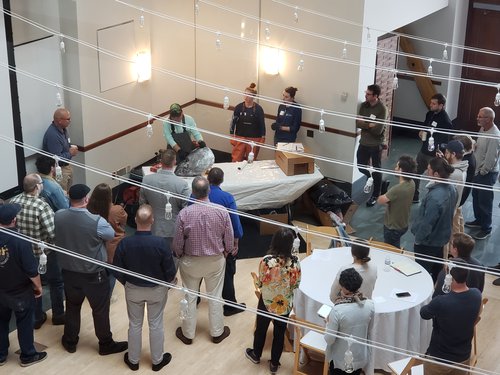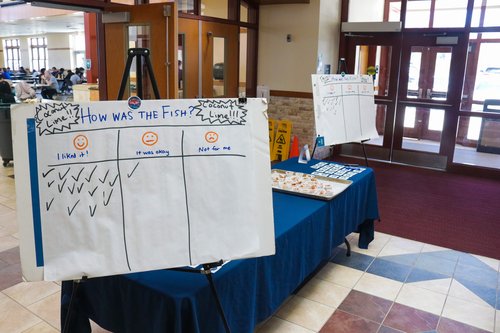2023 Sustainable Seafood Impact Report
Reports | Jan 26, 2024
We want to keep you updated on our sustainable seafood team's progress, so we've developed a report showcasing some of their biggest achievements from 2023.

Every year, our sustainable seafood team works to boost the capacity of restaurants, retailers, institutions, and processors to serve, sell, share and eat regional seafood. Together with their regional network, the team continues to strengthen the ecological and economic sustainability of the Gulf of Maine seafood industry.
Here are some highlights from 2023.
Building Demand for Local Bluefin Tuna
The U.S. Atlantic bluefin tuna (ABFT) fishery is strictly regulated, and provides a livelihood for thousands of U.S. commercial fishermen. Unfortunately, fishermen and tuna suppliers struggle to sell this highly regarded fish in domestic markets in part due to negative perceptions about its sustainability. This project aims to train fishermen on best practices to increase the quality and value of tuna being landed, and to engage local restaurants and retailers to update perceptions and increase local purchasing of bluefin tuna.

Businesses Reached Through Workshops
We held workshops for over 70 businesses, highlighting the sustainability of U.S. Atlantic bluefin tuna and debunking longstanding myths to the contrary.

Spreading the Word
Most businesses, following our workshops, said they were more likely to educate customers about the sustainability of U.S. Atlantic bluefin.
Changing Perceptions
Nearly every business that participated in our workshops said they were likely to buy more bluefin following our events.

Sea to School
One of our sustainable seafood team’s goals is to increase the amount of local seafood served in public school cafeterias across New England. This work aims to improve access to local seafood by establishing a comprehensive sea to school program focused on the Gulf of Maine region. Some goals of the program include increasing the amount of local seafood served in schools in New England by partnering with school foodservice staff and student ambassadors, developing culturally diverse local fish recipes to provide immigrant students and students from diverse backgrounds with familiar flavors and preparations, and developing and strengthening education around local seafood in schools throughout New England.
Recipes Developed
In collaboration with immigrant chef partners, we created and implemented five new recipes in school systems.

Taste Test Events
We want to make sure students actually enjoy the new recipes we implement, so we held a dozen taste test events in Westbrook and South Portland.


Food Service Staff Trained
Throughout the process of this project, we have been training food service staff to prepare local fish for students.

Kids love seafood!
A majority of students noted that they loved the new recipes sampled at our taste test events.
Improving Seafood Quality
We completed a project funded by the USDA to increase access to ice (which is critical for fishermen to maintain the quality of their catches) by installing ice equipment in four locations around New England. Earlier in the project, we worked with Vessel Services in Portland, ME, and the town of Marshfield, MA, to install equipment in both locations. In 2023, we installed equipment at Stage Harbor in Chatham, MA, and at the Portland Fish Exchange in Maine.
We are also in the midst of a project around improving quality and value for finfish, in partnership with the Maine Coast Fishermen’s Association and the Cape Cod Commercial Fishermen’s Alliance. We interviewed 21 fishermen and seven seafood processors from Maine to Cape Cod to understand current practices around quality handling. Through these interviews we discovered where there is a need for more research or education about the most effective or efficient practices, as well as where there are opportunities for processors and fishermen to work together increase value to the whole supply chain. We are also partnering with nine fishermen and three offloading locations and processors to test different quality handling practices on the water and shoreside — and measuring the results with temperature trackers and other sensors.

Industrial Ice Machines Installed
From Maine to Massachusetts, we provided four ports with access to brand new industrial ice machines, making it easier for boats that land at those ports to maintain catch quality.

Testing Quality Handling Practices
We are supporting one dozen fishermen and processors as they test out quality handling practices.
Collecting Perspectives
We interviewed 28 fishermen and processors to understand how we can work together to increase value to the whole supply chain.

Business Partnerships
We continue to support Hannaford in implementing their Local program in the seafood department, working with the 20+ seafood suppliers from around the Northeast that participate in providing local seafood to their stores. Hannaford consistently has 20 – 25 local seafood items in stores, and continues to see growth in local seafood sales each year.
The seafood team also continues to partner with nearly 40 businesses and institutions, to help them with local sourcing and more.
Media and Events
Collectively, the seafood team did 16 public speaking engagements in 2023, reaching a wide range of students, various conference participants, federal officials, national seafood industry members, and the general public.
Our work was featured across print and television news, including TV stations WCSH and other local NBC affiliates, as well as WMTW and other local ABC affiliates. We were also featured in regional newspapers including the Portland Press Herald, Nashua Telegraph, Cape Cod Chronicle, Amjambo Africa, the key trade publication for the seafood industry, Seafood Source, plus several podcasts.
Meet the Sustainable Seafood Team
Read More
-
![Translating Local Seafood]()
Translating Local Seafood
Our sustainable seafood team created a local seafood guide translated in five different languages to serve some of vibrant immigrant communities here in Maine.
Tidings
-
![Hands-on With Future Fisheries]()
Hands-on With Future Fisheries
We hosted a unique workshop on management strategy evaluation (MSE) this June, designed for fishermen and fisheries stakeholders.
Tidings
-
![Building a Healthy Blue Economy Workforce]()
Building a Healthy Blue Economy Workforce
A vital workforce is central to a thriving blue economy. By equipping more people with the necessary skills to enter and succeed in that workforce, …
Perspectives
-
![Resource Map Supports Blue Economy Entrepreneurs]()
Resource Map Supports Blue Economy Entrepreneurs
Our Gulf of Maine Ventures team developed a facilities resource map that will help startups find and connect with the R&D facilities or content area …
Tidings



